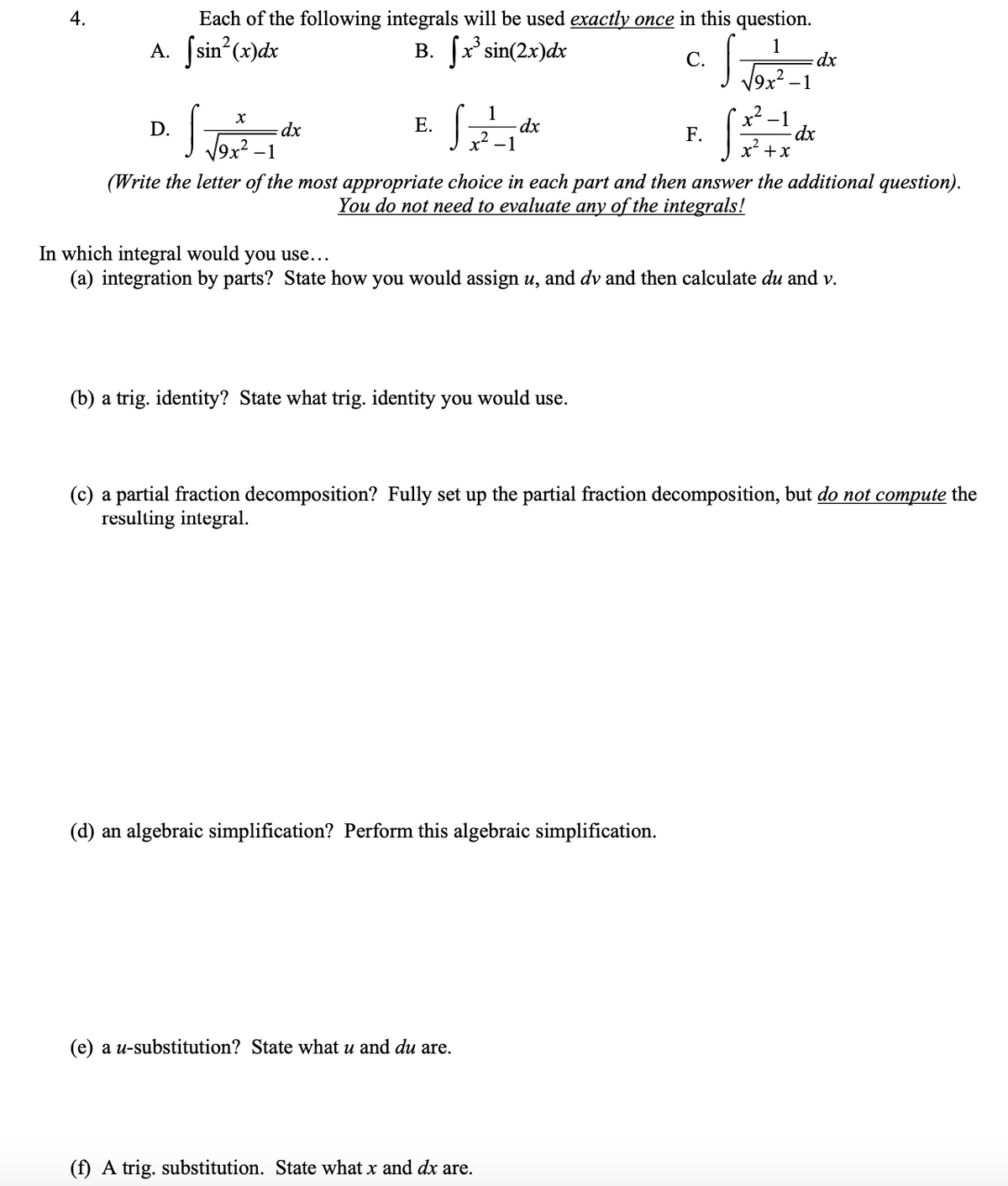Each of the following integrals will be used exactly once in this question. 1 dx 4. A. [sin°(x)dx B. [x'sin(2x)dx С. x2 -1 1 -dx -1 D. Е. F. x +x V9x? -1 (Write the letter of the most appropriate choice in each part and then answer the additional question). You do not need to evaluate any of the integrals! In which integral would you use... (a) integration by parts? State how you would assign u, and dv and then calculate du and v.
Each of the following integrals will be used exactly once in this question. 1 dx 4. A. [sin°(x)dx B. [x'sin(2x)dx С. x2 -1 1 -dx -1 D. Е. F. x +x V9x? -1 (Write the letter of the most appropriate choice in each part and then answer the additional question). You do not need to evaluate any of the integrals! In which integral would you use... (a) integration by parts? State how you would assign u, and dv and then calculate du and v.
Calculus: Early Transcendentals
8th Edition
ISBN:9781285741550
Author:James Stewart
Publisher:James Stewart
Chapter1: Functions And Models
Section: Chapter Questions
Problem 1RCC: (a) What is a function? What are its domain and range? (b) What is the graph of a function? (c) How...
Related questions
Concept explainers
Riemann Sum
Riemann Sums is a special type of approximation of the area under a curve by dividing it into multiple simple shapes like rectangles or trapezoids and is used in integrals when finite sums are involved. Figuring out the area of a curve is complex hence this method makes it simple. Usually, we take the help of different integration methods for this purpose. This is one of the major parts of integral calculus.
Riemann Integral
Bernhard Riemann's integral was the first systematic description of the integral of a function on an interval in the branch of mathematics known as real analysis.
Question

Transcribed Image Text:Each of the following integrals will be used exactly once in this question.
A. [sin (x)dx
4.
B. [x' sin(2x)dx
1
С.
1
-1
D.
dx
Е.
V9x? -1
x² -1
F.
x +x
(Write the letter of the most appropriate choice in each part and then answer the additional question).
You do not need to evaluate any of the integrals!
In which integral would you use...
(a) integration by parts? State how you would assign u, and dv and then calculate du and v.
(b) a trig. identity? State what trig. identity you would use.
(c) a partial fraction decomposition? Fully set up the partial fraction decomposition, but do not compute the
resulting integral.
(d) an algebraic simplification? Perform this algebraic simplification.
(e) a u-substitution? State what u and du are.
(f) A trig. substitution. State what x and dx are.
Expert Solution
This question has been solved!
Explore an expertly crafted, step-by-step solution for a thorough understanding of key concepts.
Step by step
Solved in 2 steps

Knowledge Booster
Learn more about
Need a deep-dive on the concept behind this application? Look no further. Learn more about this topic, calculus and related others by exploring similar questions and additional content below.Recommended textbooks for you

Calculus: Early Transcendentals
Calculus
ISBN:
9781285741550
Author:
James Stewart
Publisher:
Cengage Learning

Thomas' Calculus (14th Edition)
Calculus
ISBN:
9780134438986
Author:
Joel R. Hass, Christopher E. Heil, Maurice D. Weir
Publisher:
PEARSON

Calculus: Early Transcendentals (3rd Edition)
Calculus
ISBN:
9780134763644
Author:
William L. Briggs, Lyle Cochran, Bernard Gillett, Eric Schulz
Publisher:
PEARSON

Calculus: Early Transcendentals
Calculus
ISBN:
9781285741550
Author:
James Stewart
Publisher:
Cengage Learning

Thomas' Calculus (14th Edition)
Calculus
ISBN:
9780134438986
Author:
Joel R. Hass, Christopher E. Heil, Maurice D. Weir
Publisher:
PEARSON

Calculus: Early Transcendentals (3rd Edition)
Calculus
ISBN:
9780134763644
Author:
William L. Briggs, Lyle Cochran, Bernard Gillett, Eric Schulz
Publisher:
PEARSON

Calculus: Early Transcendentals
Calculus
ISBN:
9781319050740
Author:
Jon Rogawski, Colin Adams, Robert Franzosa
Publisher:
W. H. Freeman


Calculus: Early Transcendental Functions
Calculus
ISBN:
9781337552516
Author:
Ron Larson, Bruce H. Edwards
Publisher:
Cengage Learning